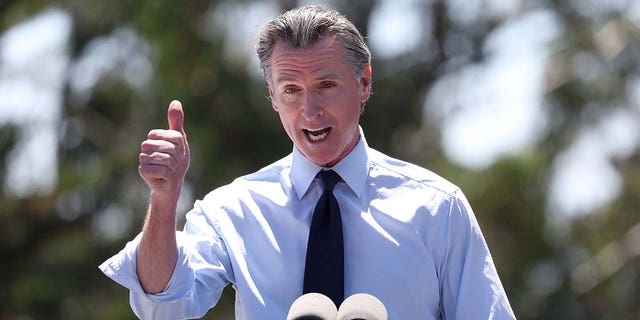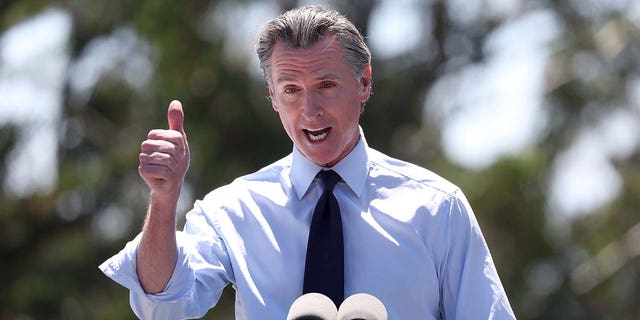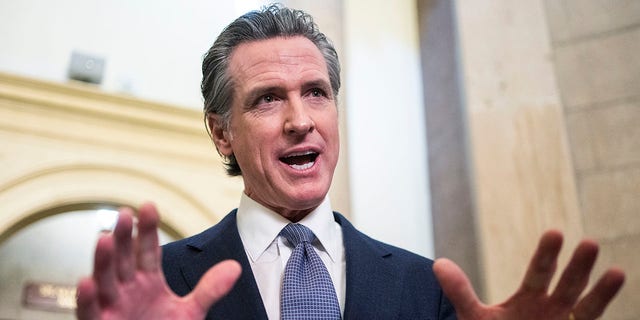
NEWYou can now listen to Fox News articles!
California Gov. Gavin Newsom on Monday vetoed a bill that would have allowed major cities like Los Angeles and San Francisco to set up facilities where people could consume drugs under supervision.
Explaining his reason, the Democratic governor said the unlimited number of safe injection sites that SB 57 would authorize “could induce a world of unintended consequences.”

FILE: California Gov. Gavin Newsom speaks during a visit to Chabot Space & Science Center with U.S. Vice President Kamala Harris on August 12, 2022 in Oakland, California. (Justin Sullivan/Getty Images)
Newsom conceded such facilities would be helpful but worried that “if done without a strong plan, they could work against this purpose. … Worsening drug consumption challenges in these areas is not a risk we can take.”
Proponents wanted to give people who already use drugs a place to inject them while trained staff stand by to help if they suffer accidental overdoses. But opponents argued that the move would in effect have condoned the use of dangerous drugs.
State Sen. Scott Wiener, a Democrat from San Francisco who authored the bill, called Newsom’s veto “tragic” and “a huge lost opportunity.”
“Sad day for CA’s fight against overdose deaths,” Wiener said in a statement.
San Francisco Mayor London Breed also called Newsom’s veto “disappointing” but vowed “we aren’t giving up.”
“Overdose prevention programs save lives and help connect people to treatment and services,” she tweeted.
WHITE HOUSE ANNOUNCES FUNDING FOR YOUTH SUBSTANCE ABUSE PROGRAMS TO TACKLE ‘OVERDOSE EPIDEMIC’
The veto left Republican leaders in the Legislature in the rare position of praising Newsom, a Democrat.
“People struggling with addiction need help, not a legal place to shoot up,” said Senate GOP Leader Scott Wilk, whose members had urged a veto in a letter to Newsom.
“We need to stop enabling criminal acts,” added Assembly Republican Leader James Gallagher, who had sent his own letter. “Instead, we should promote policies that will empower people to safely get off the streets and reintegrate into our communities.”
FATHER OF SON LOST TO FENTANYL: ‘UNBELIEVABLE’ SEIZURES OF ILLICIT DRUGS AT SOUTHERN BORDER
Tracy McCray, president of the San Francisco Police Officers Association, also praised Newsom for blocking what she said would have been “sanctioned drug dens … creating misery and chaos for the residents and businesses forced to be next to these sites.”
SB 57 was one of the most watched and most controversial measures of this legislative session. The proposal came amid a spike in overdose deaths amid a national opioid crisis.

California Gov. Gavin Newsom (D) talks with reporters after a meeting with Speaker of the House Nancy Pelosi, D-Calif., in the U.S. Capitol, on Friday, July 15, 2022. (Tom Williams/CQ-Roll Call, Inc via Getty Images)
Newsom had previously said he was open to the idea. But his decision comes as he faces increased national scrutiny as he is perceived as a possible presidential contender, though he has frequently denied any interest in running.
Newsom ordered his secretary of Health and Human Services to meet with city and county officials to discuss standards and best practices, and said he remains open to the concept once they come back to lawmakers with recommendations for how the sites could be run safely.
CLICK HERE TO GET THE FOX NEWS APP
Nationwide, drug overdose deaths increased 28.5% to more than 100,000 during the 12-month period ending in April 2021 over the same period a year earlier, according to the U.S. Centers for Disease Control and Prevention, including about 10,000 Californians.
The Associated Press contributed to this.








